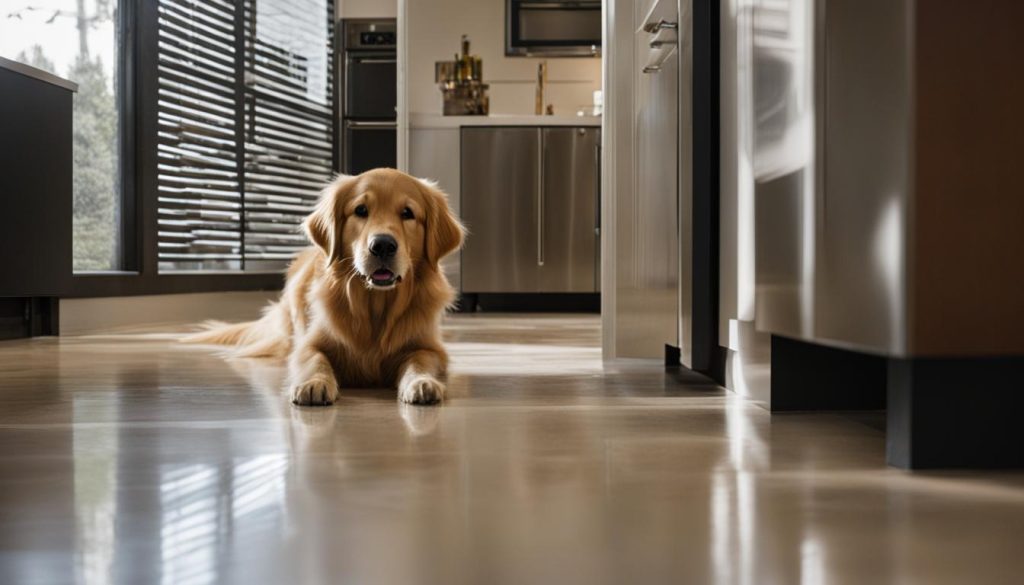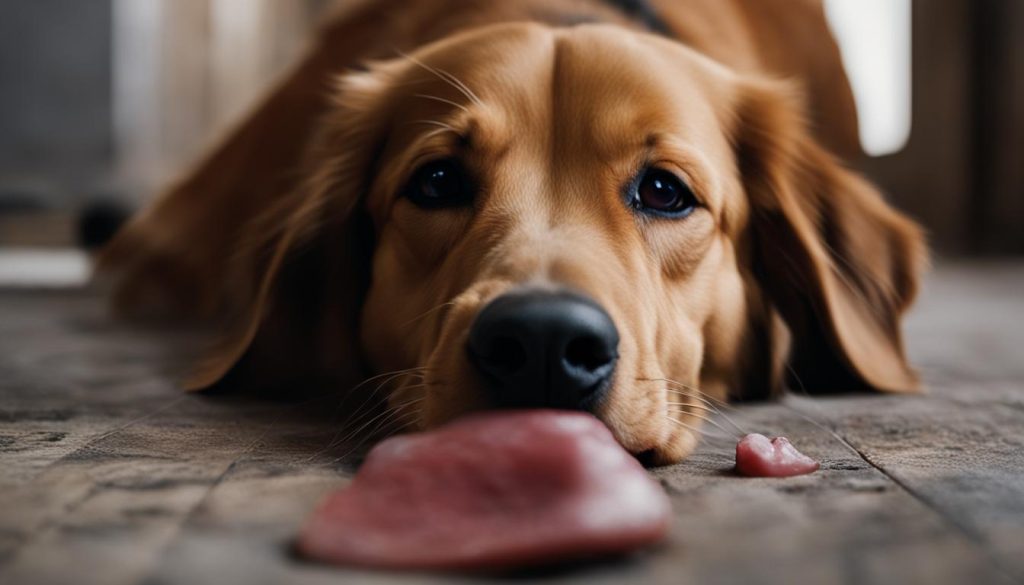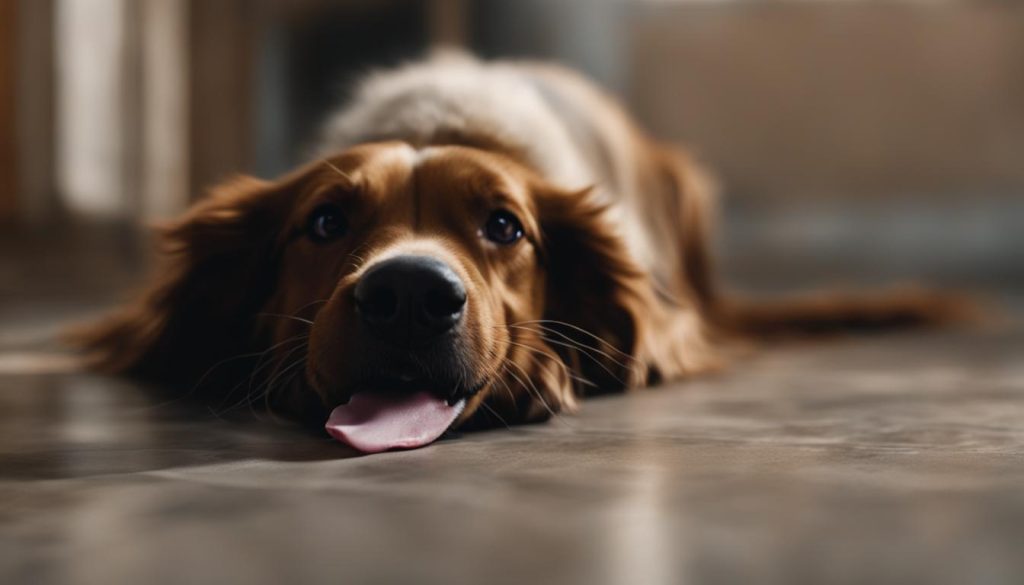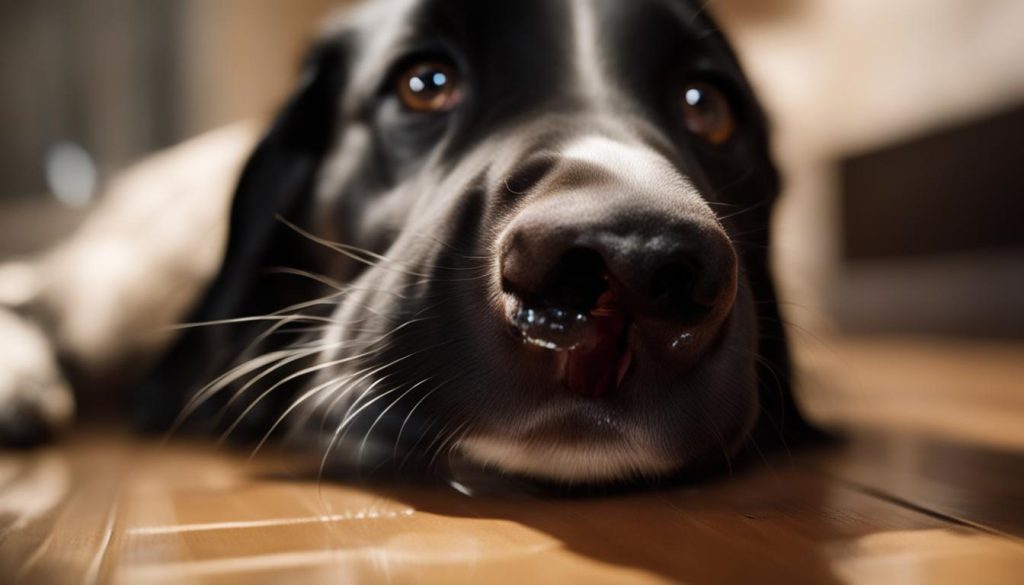As a dog owner, you may have noticed your furry friend engaging in some peculiar behaviors, one of which is licking the floor. While it may seem harmless at first, excessive floor licking could indicate an underlying issue that needs attention. In this article, I will provide expert insights into why dogs lick the floor and offer tips on how to prevent this behavior from becoming a problem.
Key Takeaways:
- Excessive floor licking in dogs may be a sign of boredom, anxiety, nutritional deficiencies, pain or illness, or a learned behavior.
- Mental and physical stimulation, a balanced diet, and addressing underlying health or behavioral issues can help prevent or reduce floor licking.
- Consult with a veterinarian for proper diagnosis and guidance tailored to your dog’s specific needs.
Excessive Licking due to Boredom and Anxiety

Dogs may lick the floor out of boredom or anxiety. This behavior can be a sign that they are seeking stimulation or trying to soothe themselves. When dogs lick, it releases endorphins, which can help them feel better in stressful situations.
If your dog is excessively licking the floor, it may indicate underlying boredom or anxiety-related issues. Providing mental stimulation and engaging in regular physical exercise can help alleviate boredom and reduce floor licking behavior. Interactive toys, food puzzles, and structured training activities can redirect their focus and provide the mental stimulation they need.
In addition to mental stimulation, it’s important to address any underlying anxiety your dog may be experiencing. This can be done through behavior modification techniques, environmental management, and, if necessary, consulting with a veterinarian. Creating a calm and safe environment for your dog can help reduce anxiety and minimize floor licking.
Remember, excessive floor licking may be a symptom of a deeper issue, so it’s always best to consult with a professional if you’re concerned about your dog’s behavior.
Table: Strategies to Reduce Excessive Floor Licking
| Strategies | Description |
|---|---|
| Provide mental stimulation | Engage your dog in mentally stimulating activities such as puzzle toys, obedience training, scent games, or interactive play. |
| Ensure regular physical exercise | Take your dog for daily walks or engage in other physical activities to help alleviate boredom and reduce anxiety. |
| Address underlying anxiety | Use behavior modification techniques, environmental management, and consult with a veterinarian if necessary to address your dog’s anxiety. |
| Create a calm environment | Provide a safe and calm environment for your dog by minimizing triggers that could cause anxiety or stress. |
By addressing the underlying causes of boredom and anxiety, and providing your dog with appropriate mental and physical stimulation, you can help reduce excessive floor licking and promote their overall well-being.
Licking to Seek Nutritional Deficiencies

Dogs may engage in excessive floor licking as a way to compensate for nutritional deficiencies in their diet. This behavior, known as dog licking pica, is more common in dogs with inadequate nutrition or those on homemade or DIY diets.
To prevent dogs from licking the floor to seek nutrients, it is crucial to ensure they are receiving a balanced and nutritious diet. Professional advice or guided feeding programs can help pet owners determine the appropriate nutritional needs of their dogs and select the right commercial food or prepare homemade meals with the necessary supplements.
By meeting the dog’s nutritional requirements through proper feeding practices, pet owners can help prevent the behavior of floor licking due to nutritional deficiencies and promote their dog’s overall health and well-being.
Excessive Licking as a Self-Soothing Behavior

Dogs may engage in excessive floor licking as a self-soothing behavior when they experience anxiety, stress, or pain. This repetitive action releases endorphins, providing temporary relief and calming effects for the dog. It is important to understand that excessive licking can be a sign of underlying emotional or physical issues that require attention and proper management.
To address excessive floor licking due to anxiety, it is crucial to identify and mitigate the root causes of the dog’s distress. Environmental modifications, such as creating a safe and comfortable space with familiar objects and soothing scents, can help reduce anxiety triggers. Additionally, implementing behavior modification techniques, such as positive reinforcement training and desensitization, can help the dog develop alternative coping mechanisms and reduce reliance on floor licking.
When excessive licking is driven by pain or discomfort, it is essential to consult with a veterinarian to identify and treat the underlying medical condition. The veterinarian may recommend medication, physical therapy, or other interventions to alleviate the dog’s pain and reduce the need for self-soothing behaviors like floor licking.
| Key Points | Actions |
|---|---|
| Dogs may excessively lick the floor as a self-soothing behavior. | – Create a calm and familiar environment for the dog. |
| Anxiety and stress are common triggers for excessive licking. | – Implement behavior modification techniques. |
| Pain or discomfort can also drive excessive licking. | – Consult with a veterinarian for proper diagnosis and treatment. |
Expert Insight:
Dr. Emily Stevens, a veterinary behaviorist, states, “Excessive licking in dogs can often be a sign of underlying anxiety or pain. It’s important to address these issues to improve the dog’s well-being and prevent the development of additional behavioral problems.”
Habitual Licking as a Learned Behavior

Dogs may develop a habit of licking the floor over time, making it a learned behavior that they continue to engage in regularly. This behavior can be challenging to break, but with proper management and training, it is possible to discourage dogs from licking the floor excessively.
The Role of Environmental Management
One effective way to address habitual floor licking is through environmental management. By preventing access to areas or objects that trigger the behavior, pet owners can help break the habit. This can be achieved by using barriers or gates to restrict access to specific areas, removing any substances on the floor that might attract licking, and redirecting the dog’s attention to alternative activities like chew toys or interactive games.
The Importance of Training and Commands
Basic obedience training plays a crucial role in discouraging floor licking. Teaching commands like “leave it” can help divert the dog’s attention away from the floor and onto more appropriate behaviors. Consistently reinforcing these commands through positive reinforcement techniques such as treats or praise can reinforce the desired behavior and discourage licking habits.
| Environmental Management | Training and Commands |
|---|---|
| Prevent access to specific areas or objects that trigger floor licking | Teach commands like “leave it” to redirect the dog’s attention |
| Use barriers or gates to restrict access | Consistently reinforce commands through positive reinforcement |
| Remove substances on the floor that attract licking | |
| Redirect the dog’s attention to alternative activities |
By combining environmental management strategies with training and commands, pet owners can effectively discourage habitual floor licking and redirect their dog’s behaviors towards more appropriate and desirable activities.
Floor Licking as a Displacement Behavior

Excessive dog licking can be a manifestation of displacement behavior, often triggered by conflict or stress. When dogs face conflicting situations or feel stressed, they may resort to floor licking as a means to relieve tension and redirect their focus. This behavior provides them with a temporary escape and helps them cope with their emotional state.
Dogs may engage in displacement behaviors like floor licking when they are experiencing changes in their routine, unfamiliar situations, or interactions with other animals. It serves as a way for them to alleviate stress and regain a sense of control in their environment. By identifying and addressing the underlying causes of conflict or stress, pet owners can help reduce the occurrence of displacement behaviors like excessive floor licking.
Understanding Conflict-Induced Displacement Behavior
Displacement behavior in dogs is a response to conflicting emotions or situations. It occurs when a dog experiences a conflict between two motivations or is subjected to stress. Floor licking is one such behavior that dogs may exhibit when they are unsure or conflicted about how to react. It serves as an outlet for their pent-up energy and helps them redirect their attention away from the source of conflict or stress.
In order to effectively manage floor licking as a displacement behavior, it is important to identify the triggers that may be causing the conflict or stress. This could involve observing the dog’s behavior in different situations and noting any patterns or associations. Once the triggers are identified, steps can be taken to minimize or eliminate them, creating a more calm and harmonious environment for the dog.
| Triggers | Management Techniques |
|---|---|
| Changes in routine | Establish a consistent daily routine for the dog, providing a sense of stability and predictability. |
| Interactions with other animals | Provide controlled and structured introductions, gradually increasing exposure to reduce tension. |
| Unfamiliar environments | Gradually introduce the dog to new environments, allowing them to acclimate at their own pace. |
“Understanding the triggers for displacement behavior can help pet owners create a supportive environment and reduce stress in their dogs. By addressing these triggers and providing appropriate outlets for their energy, we can help our furry companions find healthier ways to cope with conflict and stress.” – Dr. Jane Carter, Canine Behavior Specialist
Health Issues and Floor Licking
Floor licking in dogs can sometimes be a symptom of underlying health issues and discomfort. Dogs may engage in this behavior as a self-soothing mechanism to alleviate gastrointestinal problems, pain, or nausea. It serves as a temporary distraction and provides them with a temporary relief from discomfort. However, if excessive floor licking is accompanied by other symptoms such as vomiting, diarrhea, or signs of illness, it is important to consult a veterinarian for proper diagnosis and treatment.
Dogs may lick the floor when they are experiencing gastrointestinal issues, such as an upset stomach or digestive problems. This behavior can be seen as an attempt to alleviate the discomfort they are feeling. However, it is important to note that excessive floor licking accompanied by vomiting, diarrhea, or other signs of illness could indicate a more serious health issue and should not be ignored.
Aside from gastrointestinal problems, dogs may also lick the floor in response to pain or discomfort in other parts of their body. This could be a result of injuries, joint problems, or other underlying health conditions. If you notice that your dog is licking the floor excessively and exhibiting signs of pain or discomfort, it is best to consult with a veterinarian to determine the cause and appropriate treatment.
| Common Health Issues Associated with Floor Licking | Signs and Symptoms |
|---|---|
| Gastrointestinal problems | Vomiting, diarrhea, loss of appetite |
| Pain or discomfort | Limping, reluctance to move, whining |
| Dental issues | Bad breath, bleeding gums, difficulty eating |
| Skin allergies | Itching, redness, hair loss |
It is important to note that while floor licking can be a sign of health issues, it is not always a cause for alarm. Some dogs may engage in floor licking as a normal behavior, especially if they are inquisitive or have been trained to search for treats or food on the floor. However, if you notice a sudden increase in floor licking or if it is accompanied by other concerning symptoms, it is always best to consult with a veterinarian for a proper evaluation and guidance.
Preventative Measures to Stop Dog Licking

Dogs licking the floor can be a concerning behavior, but there are preventative measures you can take to help stop this habit. By addressing the underlying causes of floor licking and providing appropriate mental stimulation, physical exercise, and a balanced diet, you can discourage your dog from engaging in this behavior.
Environmental Management
One way to prevent your dog from licking the floor is through environmental management. Identify the areas or objects that trigger floor licking behavior and limit your dog’s access to them. For example, if your dog tends to lick the floor in the kitchen, use baby gates to keep them out of that area. Additionally, remove any substances or spills that may be tempting your dog to lick the floor.
Proper Nutrition
Ensuring that your dog receives a balanced and nutritionally complete diet can also help prevent floor licking. Consult with a veterinarian or a professional nutritionist to determine the appropriate type and amount of food for your dog. By providing your dog with the necessary nutrients, you can reduce their inclination to seek additional nutrients through floor licking.
Mental Stimulation
Boredom can contribute to floor licking behavior, so it’s important to provide your dog with mental stimulation. Engage them in activities that challenge their minds, such as puzzle toys, obedience training, or interactive play. These activities can redirect their focus and provide an outlet for their energy and instincts, reducing the likelihood of excessive floor licking.
| Preventative Measures | Benefits |
|---|---|
| Environmental Management | Prevents access to licking triggers and removes tempting substances |
| Proper Nutrition | Meets your dog’s nutritional needs, reducing the desire to lick the floor for extra nutrients |
| Mental Stimulation | Provides an outlet for energy and reduces boredom, which can contribute to floor licking |
By implementing these preventative measures, you can help stop your dog from licking the floor and promote their overall well-being. Remember to consult with a veterinarian for guidance tailored to your dog’s specific needs.
Environmental Management to Stop Floor Licking
Dogs licking the floor can be a concerning behavior that pet owners want to address. One effective approach to stop floor licking is through environmental management. By making simple changes to the dog’s environment, pet owners can discourage this behavior and redirect their dog’s attention to more appropriate activities.
Barriers and Removal of Enticing Substances
Creating physical barriers can prevent dogs from accessing areas where they tend to lick the floor. This could involve using baby gates or closing doors to restrict access to certain rooms or sections of the house. Additionally, removing enticing substances from the floor, such as spilled food or cleaning products, can eliminate the temptation for dogs to lick.
Redirecting Attention to Chew Toys and Interactive Games
Providing dogs with alternative outlets for their chewing and licking instincts can help redirect their attention away from the floor. Offering a variety of chew toys and interactive games can keep dogs engaged and mentally stimulated. Puzzle toys, treat-dispensing toys, and interactive play sessions can provide the necessary mental and physical stimulation, reducing the likelihood of floor licking.
Training and Command Reinforcement
Basic obedience training plays a vital role in preventing floor licking. Teaching commands like “leave it” or “drop it” can help redirect a dog’s focus when they show interest in licking the floor. Consistent reinforcement of these commands can train dogs to respond appropriately and avoid engaging in floor licking behavior.
| Environmental Management Techniques | Description |
|---|---|
| Physical barriers | Use baby gates or close doors to restrict access to areas where dogs tend to lick the floor. |
| Removal of enticing substances | Eliminate spilled food or cleaning products that may attract dogs to lick the floor. |
| Redirect attention | Provide dogs with chew toys, interactive games, and puzzle toys to redirect their focus away from floor licking. |
| Training and command reinforcement | Teach and consistently reinforce commands like “leave it” or “drop it” to redirect dogs’ attention and discourage floor licking. |
Nutrition and Floor Licking in Dogs
Diet plays a crucial role in preventing dogs from engaging in floor licking behavior. Providing dogs with a balanced and nutritionally complete meal can help meet their nutritional needs and minimize their inclination to seek additional nutrients through floor licking. It is essential to ensure that the right amount and quality of food are provided to dogs to maintain their overall health and well-being.
The Impact of Proper Nutrition
Proper nutrition is essential for dogs to thrive and maintain optimal health. When dogs receive a nutritionally complete diet, they are less likely to develop deficiencies that may lead to compulsive floor licking. A well-balanced diet can prevent nutrient imbalances that could trigger this behavior.
“Proper nutrition is the foundation of a healthy dog, and it can significantly contribute to reducing floor licking behavior.” – Veterinarian Dr. Lisa Thompson
Consulting a Veterinarian or Nutritionist
To ensure that dogs receive the appropriate nutrition, it is advisable to consult with a veterinarian or a professional nutritionist. They can assess the dog’s specific needs and recommend a diet that meets their requirements. Additionally, they can provide guidance on portion control, feeding schedules, and the use of specialized diets if necessary.
Choosing the Right Diet
When selecting a diet for dogs, it is important to consider their age, size, breed, and any specific health concerns. Commercially available dog food that is nutritionally complete can be a convenient option for pet owners. Homemade diets should be carefully formulated and include the necessary nutrients to avoid deficiencies that may lead to floor licking behavior. It is crucial to follow recommended guidelines and consult with professionals when preparing homemade diets.
| Nutritional Components | Importance |
|---|---|
| Proteins | Provide essential amino acids for overall health and muscle development |
| Fats | Supply energy, support healthy skin and coat, and aid in nutrient absorption |
| Carbohydrates | Provide energy and fiber for digestion |
| Vitamins and Minerals | Support various bodily functions and promote overall health |
By prioritizing a balanced and nutritionally complete diet, pet owners can contribute to reducing floor licking behavior in dogs. This, combined with appropriate mental stimulation and a conducive environment, can help ensure their furry companions lead happy and healthy lives.
- Ensure the dog’s diet is nutritionally complete and balanced.
- Consult with a veterinarian or nutritionist for personalized dietary recommendations.
- Follow feeding guidelines and portion control to avoid overfeeding.
- Consider commercial dog food or carefully formulated homemade diets.
Mental Stimulation to Reduce Floor Licking
Dogs need mental stimulation to prevent boredom and alleviate anxiety, which can contribute to floor licking behavior. Engaging dogs in mentally stimulating activities can redirect their focus and provide them with a suitable outlet for their energy and instincts. Here are some effective ways to mentally stimulate your dog:
Toys and Games
- Interactive puzzle toys: These toys require dogs to think and problem-solve to access treats or toys hidden inside. They provide mental stimulation and help redirect the dog’s focus away from floor licking.
- Tug-of-war: Engaging in a gentle game of tug-of-war with your dog can provide mental and physical stimulation. It satisfies their natural instinct to pull and tug while strengthening the bond between you and your dog.
- Treat-dispensing toys: These toys release treats as the dog interacts with them. They provide mental stimulation, encourage problem-solving skills, and keep dogs occupied.
Obedience Training and Tricks
“Teaching your dog new commands and tricks not only provides mental stimulation but also strengthens the bond and communication between you and your furry friend.” – Dr. Sarah Peterson, Canine Behavior Specialist
- Basic obedience training: Teaching your dog commands like sit, stay, and leave it can provide mental stimulation and improve their overall behavior.
- Advanced tricks: Teaching your dog more complex tricks, such as roll over, play dead, or fetch specific objects, can challenge their mind and keep them engaged.
Scent Games and Nose Work
Dogs have an exceptional sense of smell, and engaging them in scent games can provide mental stimulation and satisfy their natural instincts. Here are some scent games you can play with your dog:
- Hide and seek: Hide treats or toys around the house or in the backyard and encourage your dog to find them using their sense of smell.
- Nose work: Introduce your dog to the sport of nose work, where they have to search for specific scents hidden in boxes or containers. It can be a fun and mentally stimulating activity for dogs of all ages and breeds.
By providing mental stimulation through toys, games, obedience training, and scent work, you can help satisfy your dog’s mental needs and reduce floor licking behavior. Remember to tailor the activities to your dog’s age, breed, and individual preferences. If your dog continues to exhibit excessive floor licking despite mental stimulation, it is advisable to consult with a veterinarian to rule out any underlying health issues or anxiety disorders.
Wrapping Up
To summarize, understanding the reasons behind a dog’s floor licking behavior is crucial for addressing and preventing excessive licking habits. Dogs may engage in this behavior due to boredom, anxiety, nutritional deficiencies, pain or illness, and habitual licking. By providing appropriate mental and physical stimulation, ensuring a balanced diet, and addressing underlying health or behavioral issues, pet owners can help prevent or reduce floor licking in their dogs.
To prevent floor licking, it is important to provide dogs with mental stimulation through activities such as puzzle toys, obedience training, and interactive play. Engaging in regular physical exercise and feeding a nutritious diet can also discourage dogs from seeking additional nutrients through floor licking. Environmental management, such as preventing access to triggering areas or objects, can help break the habit of floor licking.
If a dog’s floor licking is accompanied by other symptoms or signs of illness, it is advisable to consult a veterinarian for proper diagnosis and treatment. Each dog is unique, so tailored guidance and professional advice are crucial to address specific needs and ensure the well-being of our furry friends. Remember, a happy and healthy dog is less likely to engage in excessive floor licking behavior.
FAQ
Why does my dog lick the floor?
Dogs may lick the floor due to boredom, anxiety, nutritional deficiencies, pain or illness, or habitual behaviors.
How can I prevent excessive floor licking in my dog?
Providing mental stimulation, balanced nutrition, environmental management, and addressing any underlying health or behavioral issues can help prevent excessive floor licking.
Is floor licking a sign of anxiety in dogs?
Yes, dogs may lick the floor as a self-soothing behavior to alleviate anxiety or stress.
Can a lack of essential nutrients cause dogs to lick the floor?
Yes, dogs may lick the floor to compensate for nutritional deficiencies in their diet.
How can I break my dog’s habit of licking the floor?
Environmental management, redirecting their focus to alternative activities, and basic obedience training can help break the habit of floor licking.
What is displacement behavior in dogs, and how does it relate to floor licking?
Displacement behavior is when dogs engage in unrelated behaviors to relieve stress or conflict. Floor licking can be a displacement behavior in response to such situations.
Could excessive floor licking be a sign of underlying health issues?
Yes, dogs may lick the floor to alleviate gastrointestinal problems, pain, or nausea. It is advisable to consult a veterinarian if excessive licking is accompanied by other symptoms or signs of illness.
How can I prevent my dog from licking the floor?
Providing appropriate mental stimulation, physical exercise, a balanced diet, and environmental management can help prevent dogs from licking the floor.
What can I do to manage my dog’s environment to prevent floor licking?
Preventing access to specific areas or objects that trigger floor licking, using barriers, removing enticing substances, and redirecting their attention to appropriate toys or activities can discourage floor licking.
Can a properly balanced diet reduce my dog’s inclination to lick the floor?
Yes, feeding your dog a nutritionally complete diet can reduce their desire to lick the floor for additional nutrients. Consulting with a veterinarian or professional nutritionist can help select the right diet for your dog.
How can I provide mental stimulation to reduce floor licking in my dog?
Engaging your dog in mentally stimulating activities like puzzle toys, obedience training, scent games, or interactive play can redirect their focus and reduce floor licking behavior.
How can I understand and address the reasons behind my dog’s floor licking behavior?
By considering factors such as boredom, anxiety, nutritional deficiencies, pain or illness, and learned behaviors, you can better understand and address your dog’s floor licking behavior. Consultation with a veterinarian or behaviorist may also be beneficial.






